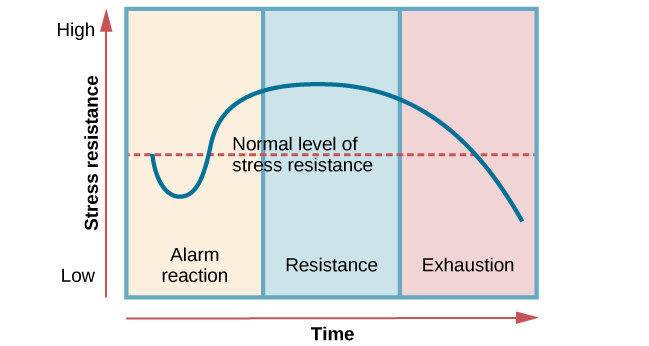STRESS - biological model of stress
1/9
There's no tags or description
Looks like no tags are added yet.
Name | Mastery | Learn | Test | Matching | Spaced | Call with Kai |
|---|
No analytics yet
Send a link to your students to track their progress
10 Terms
GAS
General adaption syndrome

STAGE 1
Alarm reaction
-Occurs when we first become aware of stress or/and body responds
Alarm reaction: Shock phase
-Acute stress response
-Body drops resistance
-Decrease in muscle tone, body temperature and blood sugar levels
Alarm reaction: Countershock phase
-Body attempts to compensate for acute stress response
-Fight, Flight, Freeze
-Increase in muscle tension, heart rate, blood glucose, temperature
STAGE 2
Resistance
Resistance features
-Body is actively dealing with stressors
-Cortisol levels at their highest: helps repair damage and maximizes body’s resources to cope
-Problems can occur due to cortisol
STAGE 3
Exhaustion
Exhaustion features
-Body runs out of reserves from long-term stressor fighting
-More susceptible to physical and psychological conditions: Infections, stomach ulcers, sleep disturbances, irritability, fatigue, anxiety, depression
Strengths
-Model suggests a predictable pattern of responses that can easily be tested in a lab
-Identifies various biological processes that occur as part of the stress response, such as hormone secretion and immune system depletion
-One of the first theories to suggest that stress can weaken the body’s resistance to illness
-There’s is research and evidence to suggest that the three stage of GAS exist and that the body’s non-specific response to a stressor is a physiological reality (At least in rats)
Limitations
-Humans and rats are different
-Doesn’t acknowledge the psychological or cognitive processing involved in human stress response
-Doesn’t account for individual differences in stress responses